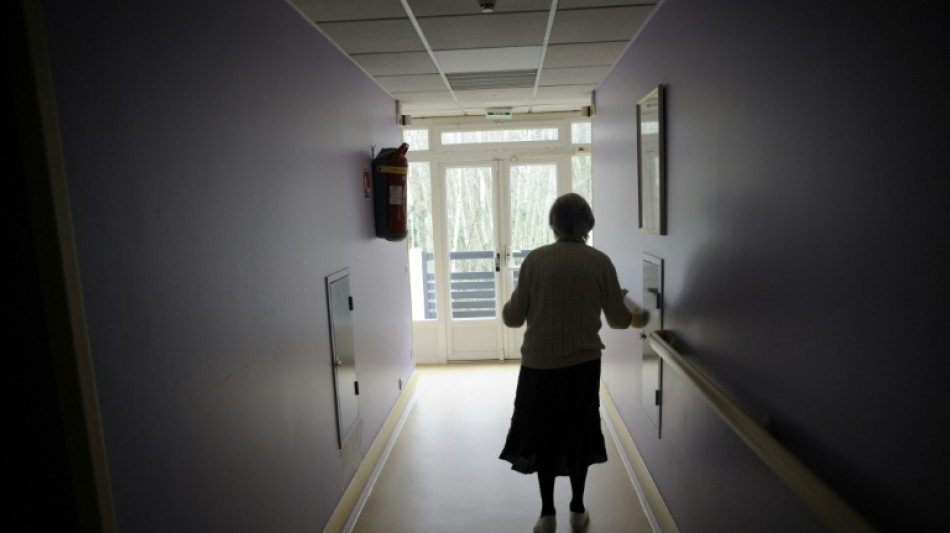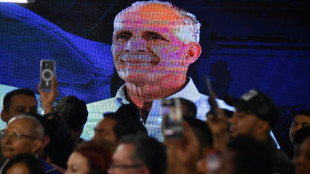
-
 'We hold onto one another and keep fighting,' says wife of jailed Istanbul mayor
'We hold onto one another and keep fighting,' says wife of jailed Istanbul mayor
-
North Korea's Kim visits nuclear subs as Putin hails 'invincible' bond

-
 Trump takes Christmas Eve shot at 'radical left scum'
Trump takes Christmas Eve shot at 'radical left scum'
-
Leo XIV celebrates first Christmas as pope

-
 Diallo and Mahrez strike at AFCON as Ivory Coast, Algeria win
Diallo and Mahrez strike at AFCON as Ivory Coast, Algeria win
-
'At your service!' Nasry Asfura becomes Honduran president-elect

-
 Trump-backed Nasry Asfura declared winner of Honduras presidency
Trump-backed Nasry Asfura declared winner of Honduras presidency
-
Diallo strikes to give AFCON holders Ivory Coast winning start

-
 Spurs captain Romero facing increased ban after Liverpool red card
Spurs captain Romero facing increased ban after Liverpool red card
-
Bolivian miners protest elimination of fuel subsidies

-
 A lack of respect? African football bows to pressure with AFCON change
A lack of respect? African football bows to pressure with AFCON change
-
Trump says comedian Colbert should be 'put to sleep'

-
 Mahrez leads Algeria to AFCON cruise against Sudan
Mahrez leads Algeria to AFCON cruise against Sudan
-
Southern California braces for devastating Christmas storm

-
 Amorim wants Man Utd players to cover 'irreplaceable' Fernandes
Amorim wants Man Utd players to cover 'irreplaceable' Fernandes
-
First Bond game in a decade hit by two-month delay

-
 Brazil's imprisoned Bolsonaro hospitalized ahead of surgery
Brazil's imprisoned Bolsonaro hospitalized ahead of surgery
-
Serbia court drops case against ex-minister over train station disaster

-
 Investors watching for Santa rally in thin pre-Christmas trade
Investors watching for Santa rally in thin pre-Christmas trade
-
David Sacks: Trump's AI power broker

-
 Delap and Estevao in line for Chelsea return against Aston Villa
Delap and Estevao in line for Chelsea return against Aston Villa
-
Why metal prices are soaring to record highs

-
 Stocks tepid in thin pre-Christmas trade
Stocks tepid in thin pre-Christmas trade
-
UN experts slam US blockade on Venezuela

-
 Bethlehem celebrates first festive Christmas since Gaza war
Bethlehem celebrates first festive Christmas since Gaza war
-
Set-piece weakness costing Liverpool dear, says Slot

-
 Two police killed in explosion in Moscow
Two police killed in explosion in Moscow
-
EU 'strongly condemns' US sanctions against five Europeans

-
 Arsenal's Kepa Arrizabalaga eager for more League Cup heroics against Che;sea
Arsenal's Kepa Arrizabalaga eager for more League Cup heroics against Che;sea
-
Thailand-Cambodia border talks proceed after venue row

-
 Kosovo, Serbia 'need to normalise' relations: Kosovo PM to AFP
Kosovo, Serbia 'need to normalise' relations: Kosovo PM to AFP
-
Newcastle boss Howe takes no comfort from recent Man Utd record

-
 Frank warns squad to be 'grown-up' as Spurs players get Christmas Day off
Frank warns squad to be 'grown-up' as Spurs players get Christmas Day off
-
Rome pushes Meta to allow other AIs on WhatsApp

-
 Black box recovered from Libyan general's crashed plane
Black box recovered from Libyan general's crashed plane
-
Festive lights, security tight for Christmas in Damascus

-
 Zelensky reveals US-Ukraine plan to end Russian war, key questions remain
Zelensky reveals US-Ukraine plan to end Russian war, key questions remain
-
El Salvador defends mega-prison key to Trump deportations

-
 Stranger Things set for final bow: five things to know
Stranger Things set for final bow: five things to know
-
Grief, trauma weigh on survivors of catastrophic Hong Kong fire

-
 Asian markets mixed after US growth data fuels Wall St record
Asian markets mixed after US growth data fuels Wall St record
-
Stokes says England player welfare his main priority

-
 Australia's Lyon determined to bounce back after surgery
Australia's Lyon determined to bounce back after surgery
-
Stokes says England players' welfare his main priority

-
 North Korean POWs in Ukraine seeking 'new life' in South
North Korean POWs in Ukraine seeking 'new life' in South
-
Japanese golf star 'Jumbo' Ozaki dies aged 78

-
 Johnson, Castle shine as Spurs rout Thunder
Johnson, Castle shine as Spurs rout Thunder
-
Thai border clashes hit tourism at Cambodia's Angkor temples

-
 From predator to plate: Japan bear crisis sparks culinary craze
From predator to plate: Japan bear crisis sparks culinary craze
-
Asian markets mostly up after US growth fuels Wall St record


Many dementia cases could be prevented, but far from all: study
Millions of cases of dementia could be prevented or delayed by reducing a range of risk factors such as smoking or air pollution, according to a major new study, though outside experts warn that such measures can only go so far.
The debilitating condition, which progressively robs people of their memories, cognitive abilities, language and independence, currently affects more than 55 million people across the world.
Dementia is caused by a range of diseases, the most common of which is Alzheimer's.
A huge review of the available evidence published in The Lancet journal on Wednesday said that the "potential for prevention is high" in the fight against dementia.
The study follows a previous report in 2020 that also emphasised the importance of prevention.
At the time, the international team of researchers estimated that 40 percent of dementia cases were linked to 12 risk factors.
The factors included people having a lower level of education, hearing problems, high blood pressure, smoking, obesity, depression, physical inactivity, diabetes, excessive drinking, traumatic brain injury, air pollution and social isolation.
The latest update adds two more risk factors: vision loss and high cholesterol.
"Nearly half of dementias could theoretically be prevented by eliminating these 14 risk factors," the study said.
- EU turns down new drug -
Decades of research and billions of dollars have failed to produce a cure or truly effective drug for dementia.
But since the start of last year, two Alzheimer's treatments have been approved in the United States: Biogen's lecanemab and Eli Lilly's donanemab.
They work by targeting the build-up of two proteins -- tau and amyloid beta -- considered to be one of the main ways the disease progresses.
However, the benefits of the drugs remain modest, they have severe side effects, and they are often very expensive.
In contrast to the US, the European Union's medicine watchdog last week refused to approve lecanemab, and it is still considering donanemab.
Some researchers hope the fact that the new drugs work at all means they will pave the way for more effective treatments in the future.
Others prefer to focus on ways to prevent dementia in the first place.
Masud Husain, a neurologist at the UK's University of Oxford, said that focusing on risk factors "would be far more cost effective than developing high-tech treatments which so far have been disappointing in their impacts on people with established dementia".
- 'How much more could we do?' -
The Lancet study was welcomed by experts in the field, among whom the importance of prevention is hardly debatable.
However, some said the idea that nearly half of all dementia cases could be prevented should be put in perspective.
It has not been proven that the risk factors directly cause dementia, as the authors of the study acknowledged.
For example, could it be dementia that is causing depression, rather than the other way around?
It is also difficult to separate the risk factors from each other, though the researchers tried.
Some could be intrinsically linked, such as depression and isolation, or smoking and high blood pressure.
Above all, many of the risk factors are societal scourges that have long proven near impossible to fully address.
The study lays out different recommendations ranging from the personal -- such as wearing a helmet while cycling -- to governmental, such as improving access to education.
"It is not clear whether we could ever completely eliminate any of these risk factors," Charles Marshall, a neurologist at Queen Mary University of London, told AFP.
"We already have public health programmes to reduce smoking and hypertension (high blood pressure), so how much more could we do?"
Tara Spires-Jones, a neuroscientist at the University of Edinburgh, said it was important that "we do not blame people living with dementia for their brain disease".
That is because "it is clear that a large portion of dementias could not be prevented due to genes and things beyond people's control, like opportunities for education as children", she added.
D.Sawyer--AMWN


